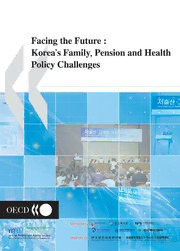
Facing the future [electronic resource] : Korea's family, pension and health policy challenges PDF
Preview Facing the future [electronic resource] : Korea's family, pension and health policy challenges
: Facingthe Future Korea’s Family, Pensionand Health Policy Challenges inttr OECD : Facing the Future Korea’s Family, Pension and Health Policy Challenges 2007 0£Cd((^ ORGANISATIONFORECONOMICCO-OPERATIONANDDEVELOPMENT ORGANISATION FORECONOMIC CO-OPERATION AND DEVELOPMENT TheOECDisauniqueforumwherethegovernmentsof30democraciesworktogethertoaddresstheeconom- ic,socialandenvironmentalchallengesofglobalisation.TheOECDisalsoattheforefrontofeffortstounder- standandtohelpgovernmentsrespondtonewdevelopmentsandconcerns,suchascorporategovernance,the informationeconomyandthechallengesofanageingpopulation.TheOrganisationprovidesasettingwhere governmentscancomparepolicyexperiences,seekanswerstocommonproblems,identifygoodpracticeand worktoco-ordinatedomesticandinternationalpolicies. TheOECDmembercountriesare:Australia,Austria,Belgium,Canada,theCzechRepublic,Denmark, Finland,France,Germany,Greece,Hungary,Iceland,Ireland,Italy,Japan,Korea,Luxembourg,Mexico,the Netherlands,NewZealand,Norway,Poland,Portugal,theSlovakRepublic,Spain,Sweden,Switzerland,Turkey, theUnitedKingdomandtheUnitedStates.TheCommissionoftheEuropeanCommunitiestakespartinthe workoftheOECD. OECDPublishingdisseminateswidelytheresultsoftheOrganisation'sstatisticsgatheringandresearchon economic,socialandenviromnentalissues,aswellastheconventions,guidelinesandstandardsagreedbyits members. ThisworkispublishedontheresponsibilityoftheSecretary-GeneraloftheOECD. Theopinionsexpressedandargumentsemployedhereindonotnecessarilyreflect theofficialviewsoftheOrganisaticnorofthegovernmentsofitsmembercountries. OECD(2007) PNdu'obelxpirlsqohsiirtnoagdt:uicotrniiogdnh.utscd@oropoeiyct,d.dtoerragncsoompriiesb,syio2nf0,aoxrr(ut3er3and1se)lsa4tG5irona2n4odfs1-t3Ahui9sg1upsutPbielnrismc,aitsis7oi5no0n0m6atoyPapbrhieost,moacFodrpaeyncwaeitph([email protected])o..ulAdppbliecaatdidornessssehdoutoldthbeeCseennttretofrOaEnfCaiDs 2 FOREWORD KoreawillagemuchfasterthanotherOECDcoimtries!Backin2000,only7%ofKorea'spopulationwereover 65;in2050,seniorcitizenswillconstituteabout37%ofKorea'spopulation.Populationageingwillunfoldatsuch ahighspeedbecauseKoreahasbeenveiysuccessfulreducinginfantmortalityratesandincreasinglifeexpectancy. Since1996,whenKoreajoinedtheOECD,lifeexpectancyatbii1hhasincreasedbyover4years themostrapid increasemtheOECD.However,Koreahasfailedtomaintainbirth-ratesatclosetoreplacementrate,andsince 1996,thefertilityratehasdroppedfrombeingjustbelowtheOECDaverageat1.6babiesperwoman,toless than1.2childrenperwoman,andKoreanowhasthelowestbirthrateamongOECDcountries. Populationageingonthisscalewillinevitablyleadtoahugeincreaseinspendingonold-ageincomesupport andhealthcare,whetherinthepublicorprivatesectors.Inaddition,thedemographicdynamicsandtheweakening ofexistingfamilynetworkswillalsorequirethedevelopmentofapublicfamilypolicywhichsupportsthereconcilia- tionofworkandcarecommitmentsofworkers.Inall,theOECDbelievesthatthreeobjectivesmustbetargeted forfuturepolicydevelopment.First,thedeclineintheworking-agepopulationneedstobeslowedsecond,working opportunitiesneedtobeextendedand,third,affordableandsustainablepensionandhealthcarepoliciesmustbe implemented. InrecognitionofthepolicychallengesthatpopulationageinginvolvesthePresidentialCommitteeonAgeing SocietyandPopulationPolicyconvenedaPolicyForumonLowfertilityandAgeingSociety:"FacingtheFuture PolicyChallengesintheAgeingEra".Thisinternationalpolicyforumtoexchangebestpracticesandpolicyexperi- encesmOECDcountrieswasheldSeptember13-14,2006inSeoul,anditwasopenedbyPrimeMinisterHan IVfyungSukofKorea,withopeningaddressesofV&nisterRhyuSiminoftheMinistr}^ofHealthandWelfare,former NewZealandPrimeMnisterMs.JennyShipleyandOECDDeputySecretary-GeneralRichard.E.Hecklinger. FortheOccasiontheOECDalsopreparedthissummarystudywhichlooksatexistingKoreanfamily,health andpensionpoliciesfromaninternationalperspectiveandconsiderstheminviewoftheemergingpolicychallenges. ThereportwaspreparedbyWillemAdema(EditorandFamilypolicy),JeremyHurst(HealthandLong-termcare policies),Ms.MonikaQueisser(Pensions)assistedbyMaximeLadaiqueandAnnettePanzera(Statisticians),under theoverallsupervisionoftheHeadoftheSocialPolicyDivision,MarkPearson. 3 Coniiut''' mmmn TABLEOFCONTENTS Foreword ExecutiveSummary 1,Settingthescene:therapidlychangingsocio-economicpolicycontext 1.1.Povertyandincomeinequality 12 1.2.Publicspendingonsocialsupport -14 1.3.Theroleoftamilysupportisweakening• 15 1.4.ExtraordinarilyrapidageingoftheKoreanpopulation 16 2.Familypolicydevelopment 21 2.1.Socio-economicfactorscontributingtolowfertilityrates 21 2.2.Directpublicpolicyintervention ill 2.3.Fertilityandemployment 27 2.4.Facilitatingthereconciliationofworkandfamilylife 27 2.4.1.Unfavourahlefemalelabourmarketoutcome.sinKorea ^30 2.4.2.BarrierstomaternalemploymentinKorea 34 2.4.1LLaboursupplyconsiderations 36 2..5.Thewayahead- 38 3.PreparingthepensionsystemfortheFuture- 43 3.1.Thecurrentsituation 43 3.1.1.Pensionspendingwillincreaserapidly 43 3.1.2.Theincomesituationandpovertyamongtheelderly- 44 3.1.3.Retirementbehaviourandthesituationofolderworkers 45 3.1.4.Movingfromretirementallowancestoprivatepensionschemes 48 3.2.KoreanpensionreformsinanOECDcontext^ 49 3.3..22..21..^P1e1nsOioEnCrDefpoerrmsspeicntiKvoereoanpensionreform r_4595 4.Towardsasustainablehealthandlong-termcarepolicy• 61 4.1.Projectionsofhealthandlongtermcarespending- 61 4.1.1.Projectionsofpublichealthcarespending- 61 4.1.2.Projectionsofpubliclong-termcarespending 65 4.1.3.Projectionsoftotalexpenditureonhealthandlong-termcare 67 4.2.Healthandlong-termcarepolicies:responsestoageingandlowfertilitytrends- 68 4.2.1.Encouraginghigherfertility 68 4.2.2.Preventingill-health 69 4.3.Financingadditionalhealthandlongtermcareexpenditure 72 4.3.1.Financinghealthservices 72 4.3.2.Financinglong-termcareservices 74 4.4.Extendingcapacity 78 4.5.Containingcosts 78 4.6.Conclusions JO Bibliography 85 EXECUTIVESUMMARY Koreafacesanextraordinaryageingchallenge.KoreawillagemuchfasterthanotherOECDcountries:in2000, about7%ofKorea'spopulationwereover65:in2050,seniorcitizenswillconstituteabout37%ofKorea'spopulation. Populationageingwillunfoldathighspeed,firstlybecauseofthedramaticincreaseinlifeexpectancyfromjust over52yearsin1960toover77yearsin2004;amajorcauseofthiswasthespectaculardecreaseininfantmortality ratesfrom45infantsper1000livebirthsin1970to5.3in2002.Thesecondcauseofpopulationageingisthe sharpdeclineinbirth-ratesfromcloseto3childrenperwomenin1975tolessthan1.2in2004.Reducedchild mortalityratesandincreasedlifeexpectancyareindicatorsofthesuccessoftheKoreaneconomyandsociety. However,thedeclineinfertilityratesinKoreaisevidenceofstrainsinsocietywhichwilldamageprosperityin thefriture. TheserapidlyunfoldingcfynamicsofpopulationagemginKoreawillchallengeexistingfamily,pensionandhealth policiesanddemandadjustmentofthesepoliciestoemergingneeds.Populationageingwillinevitablyleadtoa hugemcreasemspendingonold-ageincomesupportandonhealthandlong-termcareservices.Adaptmgtothe pressuresofanageingsocietywillalsorequirethatagreaterproportionoffutureworkingagepopulationswork. Femalelabourforceparticipationislikelytoincreasesopolicieshavetobeputinplacethatsupportabetterreconcili- ationofworkandcarecommitments.Suchpolicieswillhelpfertilityrates,slowingthedeclineintheworking-age populationandextendworkingopportumties.Thetliirdobjectivethatunderliesasuccessfulpopulationageingstrategy isvigorouslytopursuereformwhichensuresatfordableandsustainablepension,healthandlong-termcarepolicies. Familypolicy Inmanyways,Koreanfamilypolicyisinitsinfancy.TheprevalenceofthetraditionalConfucianKoreanfamily supportsystemlimitedtheneedforapublicfamilypolicyinKorea.However,theroleoftraditionalfamilynetworks isweakening,andpublicpoHcyisfindingitdifficulttofilltheemerginggap.Publicspendingonfamilybenefits (includir^maternityandearlycareandeducationsupport)wasjustover0.1percentofGDPin2003,whilepublic spendingoneducationandhealthwascloseto4and3percentofGDP,respectively.Nevertheless,thecostof educationandhealthforparentsremainsconsiderable. WhileKoreahasdevelopedacomprehensiveeducationpolicy,forparentswithveiyyoungchildrenpublicsupport ismuchmorelimited.Thedecliningbirth-ratesgiveanindicationastohowdifficultitisinKoreaforbothfathers andmotherstocombinecareerswithcarecommitmentstochildren.Thechangingnatureoffamilyrelationships andthedemographictrendstowai'dsbothmoreelderlyinneedofcareandmoredemandforfemalelaboursupply 5 Conmii'''-' furtheraddtothegrowii^needtodevelopamorecomprehensivepublicfamilypolicythatprovidessupportfor children,parentsofworkingage,andsemorcitizens. However,reformofpublicfamilybenefitsisnotenough.Fora'workandfamilypolicy'tobeeffectiveitis essentialthatworkplacepracticesgivemenandwomen,mothersandfathers,afairchanceinfulfillingtheirlabour marketaspirations.AtpresenttheKoreanlabourmarketfailstodothis.Womenfrequentlyareexpectedtodiscontinue theircareerandregularemploymentcontractsonchildbirth,ifnotalreadyonmamage,andalltoooftenemployment, careerandcarecommitmentsprovetobedifficulttocombine.Asaresult,womendropoutofthelabourforce, ordecidetohavenochildren.Bothbirthratesandfemalelabourforceparticipationratesarelowerthantheymay otherwisebe. Forbirth-ratestorebound,oratleaststabilise,andaddressfuturelaboursupplyconcernsitisnecessarytochange workplacepracticessothatpaidworkandfamilycommitmentsarenolongermutuallyexclusiveactivitiesformen andwomen. Pensionpolicy Publicspendingonretirementbenefitsislowatpresent,butrapidpopulationageingwillsoonchangethis.The sharpesteffectswillgenerallybefeltoverthenexttwo-to-threedecades,asthebaby-boomgenerationreachesretire- mentage.Giventheexistingdesignofcontributionratesandbenefitentitlements,theNationalPensionSystem(NPS) isscheduledtorunintodeficitby2036,withitsfundsbeingexhaustedin2047.Comprehensivereformofthecontrib- utory'pensions\'stemwoiidin\’olveinteralia,increasingcoverageamongtheworkingpopulation;highercontribution rates;andlow'erbenefitentitlements.Thechallengeoftindingtherightbalanceofmeasurestoensuresustainability ofthepublicpensionsystemisfurthercomplicatedbythehighpovertyriskamongtheelderly,especiallyamong thosewhodonotlivemhouseholdswiththeirchildren.Thechallengeforpensionpolicyisthustodevelopreforms thatbothimprovethefinancialsustainabilityofthepensionsystemandfightpovertyamongtheelderly. Thenecessityofsystemicpmsionreform,mcludingtheintroductionofabasicpensioniscruciallyrelatedtocoverage issues.SmceNPSpensionbenefittbrmuiaealreadyincludeabasicandaneamings-relatedcomponent,tiieintroduction ofauniversalbasicpensionwouldnotbenecessaiy'ifasufficientproportionofthepopulationwerecoveredby thescheme.However,despiterecentincreasesincoverage,thetotalnumberofcontributorsequalsabout55%of thelabourforce,andcoverage(innumbersandlevelofcontributions)isparticularlylowamongtheself-employed. ComparedtootherOECDcountries,theprojectedshareoftheumnsuredpopulationisratherlarge. Limitedcoverageincreasestheriskthatpo\'ertyamongolderpersonswillbehighinthefutiu'e(OECD,2005a). Furthermore,theeffectivenessofanypensionsysteminpreventinglarge-scaleold-agepovertyobviouslydepends onthelevelatwhichtheoldageallowancesareset.Governmentproposalsinvolveanincreaseoftheexisting means-testedold-ageallowancepaymenttoKRW80,000permonth,whereasproposalsputforwardbytheopposition parft'introduceanationalbasicpensionforallseniorcitizenswithabasicpaymentofKRW310,000.Compared 6 tothegovernmentproposals,theintroductionofsuchabasicpensionwouldreducetheold-agepo\'ertyrisk. However,theintroductionoftheuniversalbasicpensionschemewouldalsoimposeamuchhigherfiscalcost. AccordingtotheNationalPensionService'scostingof\'ariousproposals,thecombinationofauniversalbasicand eamings-relatedpensionwouldrequireexpendituresof2.5%ofGDPin2010and10.9%m2070whereasnewgovern- mentpensionreformproposalswouldcost1.2%ofGDPin2010and5.9%in2070.Thecontributionsandtaxes requiredtofundthehigherleverofpensionspendingwouldleadtoareductioninKoreanemployment,possibly byasmuchastwopercentagepointsormorebelowthatwhichwouldoccurwiththegovernmentproposals.The choicethereforeisbetweenahigherlevelofpensionerpovertyandlowertaxationoralowerlevelofpensioner poverty,highertaxationandloweremployment.Thereisno'right'answerinmakir^thischoiceitisuptothe Koreanpeopletodecide. Healthandlong-termcarepolicy Rapidpopulationageing,theweakeningoffamilynetworkstogetherwithtechnologicalchangeandrelativecost changes,aretoraiseck'amaticallythedemandsforpublicspendir^onhealthandlong-termcareinKorea.OECD projectionssuggestincreasesinspendingto2050thatarelargerthanforanyotherOECDcountryKoreamayneed tofundadditionalpublicspendingonhealthandlong-termcareservicesfromabout6to8.6percentagepoints ofGDPby2050. Anumberofkeychoiceswillhavetobemadeinfundingandprovidingextrahealthandlor^termcareservices asthepopulationages.Whatshouldbetheroleforpublicservices,familiesandindividualsinfundmgcare,and whatshouldbetherolesofformalandinformalcarers,respectively,indeliveringthelong-termcareserviceswhich willbeneeded? Vigorouspromotionofhealthyageingwillbecriticalformanagingtheextrademandforhealthandlongterm care.Forexample,moreshouldbedonetoreducethehighrateofsmokingamongmeninKorea,and/ortomaintain agooddietandahighrateofphysicalactivityinthe(elderly)population. Anewsocialprotectionschemeforlong-termcarewouldrelievethepressurefor'socialhospitalisation',butcare mustbetakentodesignitinsuchaway,forexamplethroughincometestmg,thatitremainsaffordableashie old-agedependencyburdenontheworkingpopulationincreases.Theelderlypopulationthemselvesshouldbeex- pectedtocontributetotherisingcostsofhealthandlor^-termcareaspensionsgrowandtheirsavingsaccumulate. Theyshouldbeexpectedtomakecontributionstotherelevantinsuranceschemesandtocontinuetomakeco-pay- ments,subjecttoassistanceforthepoor. Itisimportanttomaintainasfaraspossiblethecontributionoffamilyandinformalcarerstothecareofthe elderly.Careathomeshouldbepromotedanduseshouldbemadeofmonetary'paymentstoinformalcarers,when appropnateandofrespitecareforthedependentelderly.Theseandothercostcontainmentmeasureswillalsobe criticalforthelong-termfinancialsustainabilityofbothhealthandlong-termcareinsurance. 7 Copyrightedt TTlIlInlluPsoi!liJicsyacuFe^omrsauisma onLowFertilityandAgeingSociety FacingtheFuture;PolicyChallengesintheAgeirsgEra Setting the scene: the rapidly changing socio-economic policy context 9j>
